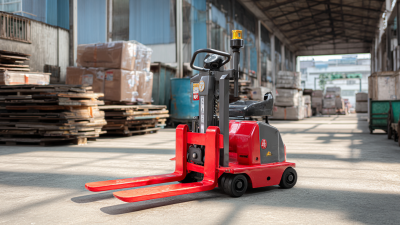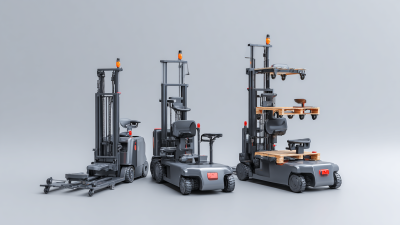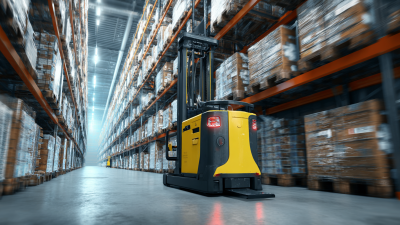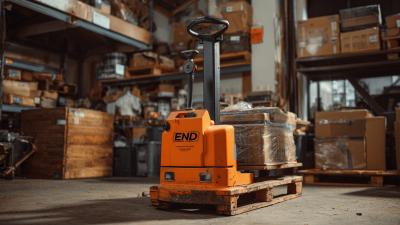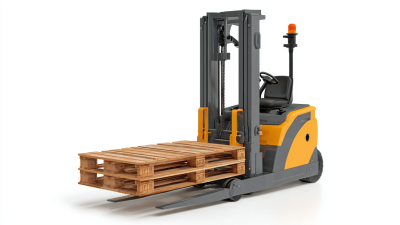Leave Your Message
In the rapidly evolving landscape of warehouse logistics, the choice of equipment can significantly impact operational efficiency. Recent industry reports indicate that the global pallet jack market is expected to reach $3.5 billion by 2028, highlighting the growing demand for advanced handling solutions.

Among these, the Lithium Ion Pallet Jack stands out due to its superior performance, sustainability, and cost-effectiveness. Unlike traditional lead-acid models, lithium-ion alternatives offer faster charging times, longer lifespan, and reduced maintenance costs, making them increasingly preferred by warehouse managers seeking to optimize workflows. With the market shifting towards electric and eco-friendly solutions, understanding the features and benefits of a Lithium Ion Pallet Jack is crucial for making informed purchasing decisions tailored to your specific warehouse needs.
When selecting the right lithium-ion pallet jack for your warehouse, understanding your specific requirements is crucial. Different warehouses have varied layouts, load capacities, and operational demands, so taking the time to assess these factors can significantly impact your choice. Consider the terrain, as some pallet jacks are designed for smooth floors while others can handle uneven surfaces. Additionally, evaluate the average weight of the loads you'll be moving, ensuring you choose a model with an appropriate load capacity.
**Tip:** Conduct a thorough inventory analysis before making your decision. Knowing the weights and dimensions of the products you regularly handle will guide you in selecting a pallet jack that maximizes efficiency while adhering to safety standards.
Another essential factor to consider is the frequency of use. If your warehouse operations demand high mobility and long usage hours, investing in a lithium-ion pallet jack with a larger battery capacity can save time and enhance productivity. Also, assess the charging infrastructure available within your warehouse to ensure seamless operation without prolonged downtime.
**Tip:** Look for models that offer fast charging capabilities to minimize idle time during peak operational hours. This feature can significantly enhance workflow efficiency and reduce the need for battery swaps.

When selecting a lithium-ion pallet jack for your warehouse needs, several key features should be at the forefront of your decision-making process. First and foremost, consider the battery life and charging time. A reliable pallet jack should offer extended operating hours and a quick recharge capability, ensuring minimal downtime. Additionally, look for options with integrated energy management systems that optimize usage and extend battery lifespan, aligning with the industry trend of maximizing efficiency and sustainability.
Another crucial feature to evaluate is the operational performance and ergonomics of the pallet jack. Models designed with compact chassis configurations, power steering, and advanced maneuverability are essential for navigating tight spaces in narrow aisles. Moreover, safety must not be overlooked; features such as automatic braking systems and stability protocols can significantly enhance operator safety. By emphasizing these characteristics, you can ensure that your choice in a lithium-ion pallet jack will improve productivity and meet the demands of modern warehouse operations.
When selecting the right lithium-ion pallet jack for your warehouse, it's crucial to compare different models based on your operational needs. Start by considering the weight capacity of each pallet jack. Some models are designed for light-weight loads, while others can handle heavier items. Knowing your typical load weights will help narrow down your options. Additionally, evaluate the dimensions and maneuverability of each model. A pallet jack that fits your warehouse layout and can easily navigate tight spaces is essential for maintaining efficiency.
Another key factor to compare is battery life and charging times. Lithium-ion batteries generally offer extended run times and quicker charging capabilities, which can drastically enhance productivity in a busy warehouse setting. Assess your operation's workload to determine how many hours of use you'll need before recharging. Furthermore, examine the service and support options available for each model. A reliable manufacturer that provides excellent customer support can make a significant difference in ensuring minimal downtime and keeping your operations running smoothly.
When selecting the right lithium ion pallet jack for your warehouse needs, evaluating battery performance is crucial. Lithium ion batteries offer numerous advantages, including faster charging times and longer lifespans compared to traditional lead-acid batteries. A vital aspect to consider is the discharge rate; ensure the battery can maintain high performance throughout its lifespan, especially during peak operational hours. Look for models that provide real-time battery monitoring, allowing you to track the health and efficiency of the battery over time.
Charging options are equally important in maintaining productivity. Fast charging capabilities can significantly reduce downtime, allowing your pallet jack to be back in action quickly after a shift. Consider investing in a pallet jack that can accommodate opportunity charging, enabling you to recharge during breaks without the need for an extended downtime.
Tip: Always check for manufacturers that offer smart charging systems that adjust the charging rate based on the battery's state to prolong its lifespan and enhance performance. Additionally, consider the availability of backup charging options to ensure your operations run smoothly, even during unexpected power outages.
| Model | Battery Capacity (Ah) | Charge Time (Hours) | Lifting Capacity (lbs) | Weight (lbs) |
|---|---|---|---|---|
| Model A | 150 | 2.5 | 4000 | 600 |
| Model B | 180 | 3 | 4500 | 650 |
| Model C | 220 | 2 | 5000 | 700 |
| Model D | 200 | 1.5 | 4800 | 680 |
When investing in a lithium-ion pallet jack for your warehouse, budget considerations play a crucial role in ensuring long-term efficiency and savings. According to the Material Handling Industry (MHI), the cost of equipment can significantly impact operational budgets, with pallets and lifts often representing up to 20% of total warehouse expenses. Opting for a higher initial investment in quality lithium-ion technology can lead to reduced maintenance costs and longer lifespan. Studies indicate that lithium-ion batteries can last up to 2,000 cycles, compared to traditional lead-acid batteries, which last around 1,500 cycles. This translates into fewer replacements and potentially lower overall costs over time.
Further, the efficiency gains associated with lithium-ion pallet jacks can enhance productivity, directly affecting your bottom line. The Industrial Truck Association reports that lithium-ion equipment often sees a performance increase of up to 30%, allowing for faster operations and improved labor productivity. By considering not just the upfront costs, but also the operational efficiencies and longevity of lithium-ion pallet jacks, you can make a more informed decision that maximizes your investment and sets your warehouse up for success well into the future.

